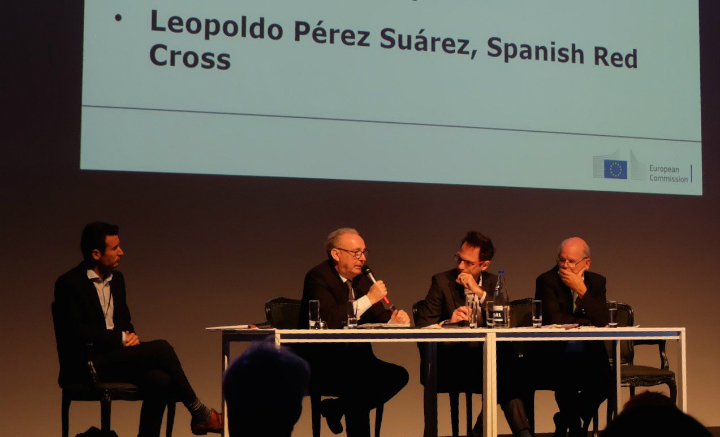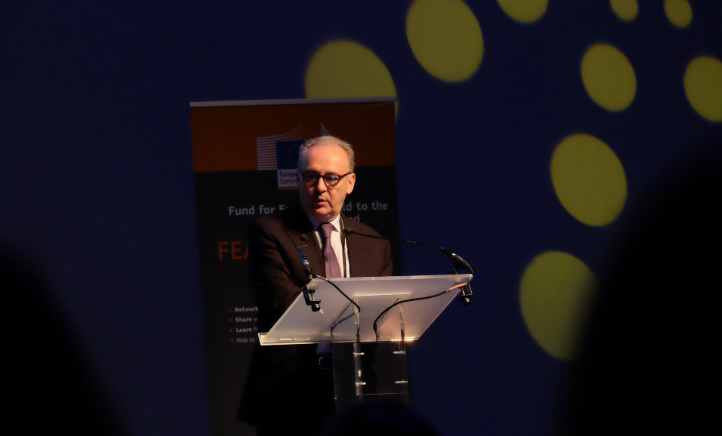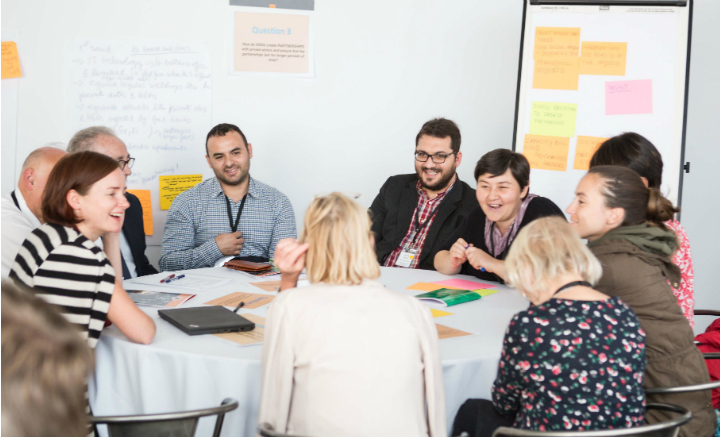Seventh FEAD Network Meeting: preventing food waste through FEAD actions

With the theme of “Preventing food waste through FEAD actions”, the seventh Network Meeting of the Fund for European Aid to the Most Deprived (FEAD) was held on Thursday 21 September in Brussels. Representatives from the Spanish Red Cross, French Red Cross, Polish Red Cross, Bulgarian Red Cross, and the Red Cross EU Office, were amongst the 96 people attending from over 70 national managing authorities and civil society organisations.
In her key-note speech, Anne-Laure Gassin from the European Commission Directorate-General for Health and Food Safety, drew attention to the fact that 8.5 per cent of European citizens could not afford a quality meal every second day in 2015, yet 88 million tonnes of food are wasted annually in the EU. Noting that this wastefulness costs approximately EUR 154 billion each year, Ms Gassin urged for strengthening the sustainability of the food system, while underlining the priority to protect health.
Food waste detrimentally affects the most vulnerable people in society, and contributes to poverty in numerous ways. Its economic effects increase costs and price volatility, making food less affordable and leading to greater food insecurity for many. When people have limited access to nutritionally adequate or safe food, malnutrition results, and with it, chronic diseases, mental health issues, and poor academic performance among children.
During the first panel discussion of the day, Leopoldo Pérez Suárez, Secretary General of the Spanish Red Cross, presented the experience of the Red Cross in preventing food waste through FEAD actions. He outlined how the Red Cross uses FEAD for aid distribution in multiple EU countries.

The Red Cross is typically involved in collecting unsold products from supermarkets and distributing them to vulnerable people through local branches, for example in France, Slovenia, and Spain. Where retailers prefer to throw away food, or where there are not enough donations, the Red Cross invests in promoting food donations and advocating for changes in legislation. Comprising products like rice, pulses, olive oil, tinned fish, fried tomatoes and baby food, food aid is primary among the different kinds of support to address urgent needs through FEAD.
Furthermore, “providing food aid allows us an opportunity to identify and access people in need of other forms of assistance,” Mr Pérez Suárez explained. Accompanying food aid, the Red Cross provides psychological and social support and guidance with housing issues, as well as delivering non-food items such as hygiene products and school supplies. The Red Cross also uses FEAD alongside other EU instruments, such as the European Social Fund (ESF) for employment assistance, and the Asylum, Migration and Integration Fund (AMIF) for migrants, to provide more holistic support through a “whole-person approach”.
A key challenge stressed by Mr Pérez Suárez is the difficulty of reaching those who are not registered with social services despite, and sometimes because of, living with poverty and social exclusion. This includes, for instance, migrants in an irregular situation and rough sleepers. It is crucial to offer meals on the basis of need. In Sicily, the Italian Red Cross collects food that would otherwise go to waste and offers it to people on the principle, “if you need it, take it,” without registration or request procedures. Anyone can also come for a meal offered by the Finnish Red Cross, made from leftovers collected from school kitchens. This initiative reaches around 100 people per day through each local branch involved.

Another panel discussion and a series of workshops throughout the rest of the day focused on the practical implementation of food waste prevention initiatives. Representatives from major retailers, including Tesco, AB Vassilopoulos, and Spar, discussed their social responsibilities. There was a high level of agreement regarding the need to incorporate food waste prevention into shops’ habits. Meanwhile, the experiences of participants that work in the distribution of food aid revealed the importance of making sure people have the knowledge and equipment necessary to safely prepare the products they receive. By bringing together actors involved in the various stages of food waste prevention and food aid, these discussions were an opportunity to increase mutual understanding. The ideas discussed have the potential to strengthen food aid as a means of providing access to immediate relief and long-term social reintegration for a range of vulnerable people.
Download the European Commission meeting report
More information on the European Commission’s action to stop food waste is available here.
Click here to find out more about FEAD.
The next FEAD Network meeting will be held in Paris on Monday 13 November and Tuesday 14 November, hosted by the French Government and the European Commission. If you are interested in joining the community, please contact Eberhard Lueder.
For media inquiries, please contact Eva Oyón on: eva.oyon@redcross.eu or +32 2 235 09 22

